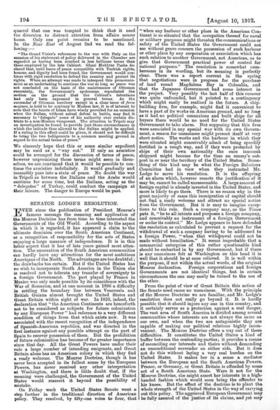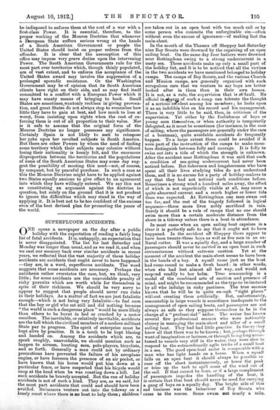SENATOR LODGE'S RESOLUTION.
EVEREVER since the publication of President Monroe's message the meaning and application of the Monroe Doctrine has from time to time interested the Governments of the Old World. According to the aspect in which it is regarded, it has appeared a claim to the ultimate dominion over the South American Continent, or a recognition of responsibility for the acts of States enjoying a large measure of independence. It is in this latter aspect that it has of late years gained most atten- tion. The annexation of the South American communities can hardly have any attractions for the most ambitious Americans of the North. The advantages are too doubtful ; the drawbacks too certain. But if the United States has no wish to incorporate South America in the Union she is resolved not to tolerate any transfer of sovereignty to a foreign Government. The part played by France in Mexico was only made possible by its coincidence with the War of Secession, and at one moment in 1896 a difficulty in settling the boundary line between Venezuela and British Guiana almost brought the United States and Great Britain within sight of war. In 1823, indeed, the declaration that " the American Continents are henceforth not to be considered as subjects for future colonization by any European Power " had reference to a very different condition of things from that which exists now. It was associated with the recent recognition of the independence of Spanish-American republics, and was directed in the first instance against any possible attempt on the part of Spain to recover possession of them. But the prohibition of future colonization has become of far greater importance since that day. All the Great Powers have under their rule a large number of intending emigrants, and Great Britain alone has an American colony in which they find a ready welcome. The Monroe Doctrine, though it has never been accepted in its fullest sense by the European Powers, has never received any other interpretation at Washington, and there is little doubt that, if the meaning were challenged, the Government of the United States would reassert it beyond the possibility of mistake.
On Friday week the United States Senate went a step further in the traditional direction of American policy. They resolved, by fifty-one votes to four, that " when any harbour or other place in the American Con- tinent is so situated that the occupation thereof for naval or military purposes might threaten the communications or safety of the United States the Government could not see without grave concern the possession of such harbour or other place by any corporation or association which has such relation to another Government, not American, as to give that Government practical power of control for national purposes." The resolution is somewhat cum- bersome in its wording, but its meaning is perfectly clear. There was a report current in the spring that negotiations were in progress for the purchase of land round Magdalena Bay in Colombia, and that the Japanese Government had some interest in the project. Very possibly the last half of this rumour was quite unfounded, but it pointed to a contingency which might easily be realized in the future. A ship- building firm, for example, might find it convenient to have a part of its works on American ground, and so lona as it had no political connexions and built ships for all buyers there would be no need for the United States Government to take alarm. But supposing that this firm were associated in any special way with its own Govern- ment, a reason for uneasiness might present itself at very short notice. The works and the harbour in which they were situated might conceivably admit of being speedily fortified in a rough way, and if they were protected by ships of their own nationality the once innocent shipyard might become for the time an enemy's out- post in or near the territory of the United States. Some- thing of this kind may be what the Foreign Relations Committee had in view when they instructed Mr. Lodge to move his resolution. It is the offspring of an alarm which, however remote the justification of it may be, cannot be called unreasonable. A large amount of foreign capital is already invested in the United States, and more is likely to go there. There is no reason why in the great majority of cases this immigration of capital should not find a ready welcome and attract no special notice from the Government. But it is easy to imagine excep- tions to this rule. Such a company may, as the Times puts it, "be to all intents and purposes a foreign company, ° and conceivably an instrument of a foreign r'Government or under its control." Mr. Lodge appears to have defended the resolution as calculated to prevent a request for the withdrawal of such a company having to be addressed to a foreign Power, " when that withdrawal could not be made without humiliation." It seems improbable that a commercial enterprise of this rather questionable kind should be embarked in by any Government, but if there is any uneasiness felt at Washington on this head it is well that it should be at once relieved. It is well within the purpose, if not within the actual words, of the original Monroe declaration. Foreign corporations and foreign Governments are not identical things, but in certain circumstances the one may easily be turned to the use of the other.
From the point of view of Great Britain this action of the Senate need cause no uneasiness. With the principle of the Monroe Doctrine we are familiar, and Mr. Lodge's resolution does not really go beyond it. It is hardly possible that it should injure any one in this country, and it certainly serves as a protection against a real danger. The vast area of South America is divided among several communities whose interests are not always the same as our own, and when the two are antagonistic they are capable of making our political relations highly incon- venient. The Monroe Doctrine offers a way out of these difficulties. It constitutes the United States a kind of buffer between the contending parties; it provides a means of reconciling our interests and theirs without demanding an unconditional surrender on either side. But it does not do this without laying a very real burden on the United States. It makes her in a sense a mediator between the European and the South American Powers. France, or Germany, or Great Britain is offended by some act of a South American State. Were it not for the Monroe Doctrine, she might assert her interests in a high- handed fashion which would soon bring the offender to his knees. But the effect of the doctrine is to plant the whole strength of the United States in the way of carrying out this policy. The aggrieved European Government may be fully assured of the justice of its claims, and yet may be indisposed to enforce them at the cost of a war with a first-class Power. It is essential, therefore, to the proper working of the Monroe Doctrine that whenever a Etiropean State suffers serious wrong at the hands of a South American Government or people the United States should insist on proper redress from the offender. It is clear that the assumption of this office may impose very grave duties upon the intervening Power. The South American Governments rule for the most part over territories which, though thinly populated, are of vast extent, and to enforce the acceptance of the United States award may involve the suppression of a prolonged sporadic resistance. Or the Washington Government may be of opinion that its South American clients have right on their side, and so may find itself committed to a conflict with a European Power which it may have scanty means of bringing to book. Small States are sometimesovantonly reckless in* giving provoca tion, and great StateS do not always stop to remember how little they have to gain at best, and how much to lose at worst, from insisting upon rights when the cost of en- forcing them is out of all proportion to their value. Nor is it safe to assume that the original form of the Monroe Doctrine no longer possesses any significance. Certainly Spain is not likely to seek to reimpose her yoke upon her revolted subjects in South America. But there are other Powers by whom the need of finding some territory which their subjects may colonize without losing their nationality is keenly felt, and the enormous disproportion between the territories and the populations of some of the South American States may some day sug- gest the possibility of meeting this need—not, of course, by conquest, but by peaceful purchase. In such a case as this the Monroe Doctrine might have to be applied against two States equally anxious to give effect to an agreement into which they have willingly entered. We say this not as constituting an argument against the doctrine in question, but solely on the ground that it is not prudent to ignore the difficulties which may stand in the way of applying it. It is best not to be too confident of the success even of the best devised plan for promoting the peace of the world.



































 Previous page
Previous page